US Lawmakers Propose Legislation To Bar Iran Regime Insiders
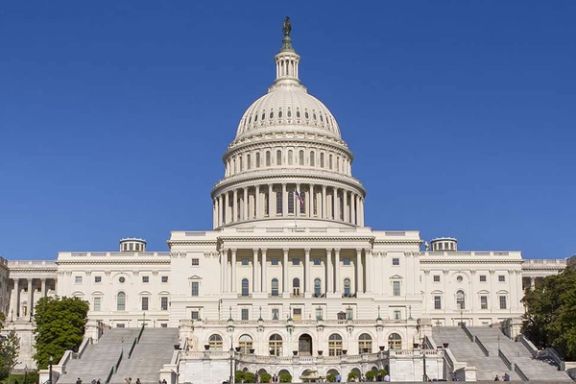
A bipartisan group of US lawmakers have proposed legislation to refuse visas and revoke any issued to Iranian regime insiders and their families.

A bipartisan group of US lawmakers have proposed legislation to refuse visas and revoke any issued to Iranian regime insiders and their families.
The initiative is dubbed Revoking Entry Granted to Iranian Mullahs and Elites Act of 2022 or REGIME Act. It would target not only those officials responsible for repression and crackdown on protesters but also their immediate family members, Al Monitor reported Monday.
The legislation would direct the Secretary of State to conduct a review of whether a wide-ranging group of Islamic Republic officials – including members of the Revolutionary Guard (IRGC), Supreme Leader’s office and security forces – and their family members are in possession of US visas or have applied for them.
The legislation is led by Reps. Joe Wilson (R-S.C.), Josh Gottheimer (D-N.J.), Claudia Tenney (R-N.Y.), and Vicente Gonzalez (D-Texas).
It is not clear what sorts of US visas will be impacted if the legislation is adopted. Already, some individuals fitting the criteria might have obtained US permanent residency or even became naturalized citizens.
These individuals can apply for visas for their immediate family members according to US immigration law.
Recently, Canada also issued regulations banning entry for 10,000 IRGC members and possibly people affiliated with Key elements of the Iranian regime.
“In light of the actions of the regime it is particularly unbelievable that Iranian officials and family members are being given visas to come to the US to enjoy the very liberties their own citizens can only imagine,” Wilson told Al-Monitor.
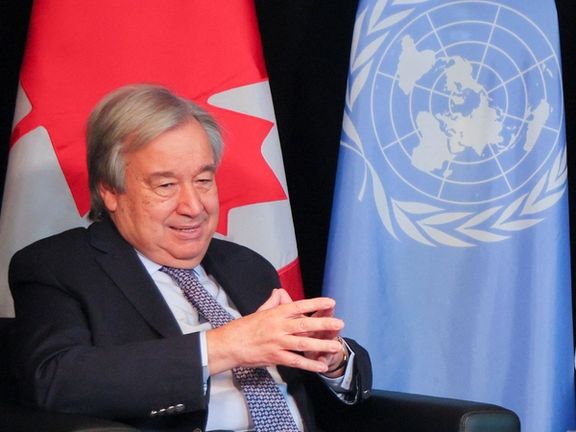
United Nations Secretary-General Antonio Guterres Monday slammed as "totally unacceptable" the crackdown by Iran’s authorities on protests.
In a wide-ranging news conference to close out 2022, Guterres also said that he "will not relent in the pursuit of peace in Ukraine in line with international law and the United Nations Charter." A key principle of the founding UN Charter is respect for sovereignty and territorial integrity.
He is "not optimistic" about the possibility of effective Ukraine and Russia peace talks in the immediate future and believes the military confrontation will go on but added that he "strongly hopes" there can be an end to the war in 2023.
The General Secretary added on Iran that "we are witnessing massive violations of human rights that we strongly condemn."
He also said there is a risk of losing the 2015 Iran nuclear deal known as JCPOA. Long negotiations since April 2021 between the West and Iran came to an impasse in September and since, the United States and European powers say they are focused on the human rights situation in Iran and not on the JCPOA.
The UN Human Rights Council has slammed Iran’s violations and decided to launch an investigation into killings and large-scale imprisonments. Iran was also expelled last week from the UN Commission on the Status of Women, in a drive led by the US.
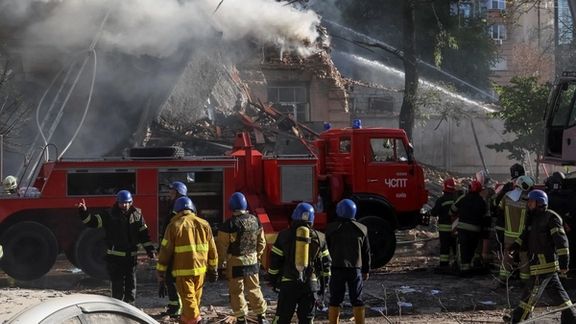
A Ukrainian senior intelligence official says Russia has received a new shipment of Iranian-made Shahed-136 kamikaze drones from the Islamic Republic of Iran.
According to Ukraine’s defense intelligence (GUR) spokesman Andriy Yusov, the new shipment is smaller than the previous one sometime in the summer that is estimated to have included at least 400 UAVs.
Russia used the initial supply in October and November, but reports from Ukraine indicated that for 2-3 weeks no Iranian drones were deployed from mid-November, indicating a possible shortage.
"This is a new batch [of Shahed drones], we do not comment on its size, but we see that Shaheds were not used during yesterday's massive terrorist missile strikes. All other available weapons were used, and these were all missiles and no Shaheds. This is a new batch, but this one, compared to the initial mass use of Shahed, is obviously smaller," said Yusov on Sunday.
Iran's foreign minister Hossein Amir-Abdollahian once again denied Iran has supplied drones to Russia to be used against Ukraine, in a speech in Tehran on Monday, while previously he had acknowledged having provided drones to Moscow "before the Ukraine war began."
Ukrainian president Volodymyr Zelensky in October said that Russia has ordered 2,400 of the suicide drones from Iran. But Iran’s production is slow, and it also needs to save enough of the UAVs for its own military.
Yusov also spoke of previous agreements reached between Russia and the Islamic Republic regarding the supply of ballistic missiles, saying, "As of today, we have not seen Iranian ballistic missiles in Russia for use against Ukraine, although such a possibility exists, and this information is being monitored. Also, certain efforts are being made to ensure that this scenario is not implemented. But there is such a threat.”
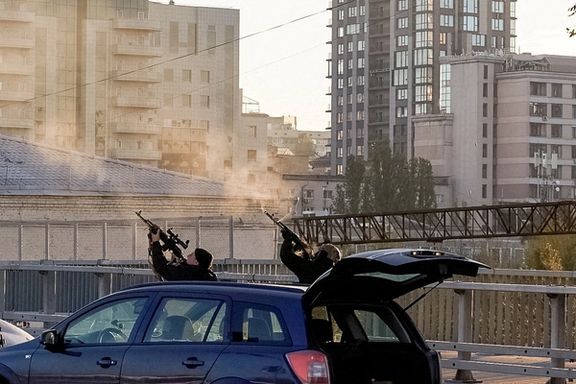
As reported by Ukrinform, overnight December 14, Russian armed forces attacked Ukraine with Iranian-made Shahed-136/131 kamikaze drones. All 13 UAVs were shot down by air defense forces.
The EU Council of Foreign Ministers adopted a resolution condemning Iran’s action in supplying weapons to Russia for use in its war of aggression against Ukraine.
Earlier in December, Kyiv's air defense systems shot down 10 Iranian-made drones, while the United States is closer to sending its Patriot air defense system to Ukraine. Kyiv Mayor Vitali Klitschko said that air-defense systems shot down 10 Iranian-made Shahed drones and that there were explosions in the central Shevchenkivskyi district.
The Patriot system would help Ukraine defend against waves of Russian missile attacks that have pounded the country's energy infrastructure, but are not expected to be used against cheap drones, as each missile costs $4 million, while Iranian drones are worth just $20,000.
The United States and its European allies have also imposed rounds of sanctions against Iranian individuals and entities for their involvement in supplying drones to Russia. The latest instance of such sanctions was announced by the United Kingdom on Tuesday.
Foreign Secretary James Cleverly said UK sanctions were “taking the wheels off the Russian war machine.” A press release referred to “information” released by the US December 9 - apparently a statement by White House Security spokesman John Kirby - showing Iran had become “one of Russia’s top military backers.”
The Pentagon says Russia's recent surge in missile strikes is partly designed to exhaust Ukraine's supplies of air defenses so it can dominate the skies above the country.
For that reason, the United States and its allies have been delivering more air defenses to Kyiv, everything from Soviet-era systems to more modern, Western ones. Washington has provided NASAMS air defense systems that the Pentagon says have flawlessly intercepted Russian missiles in Ukraine.
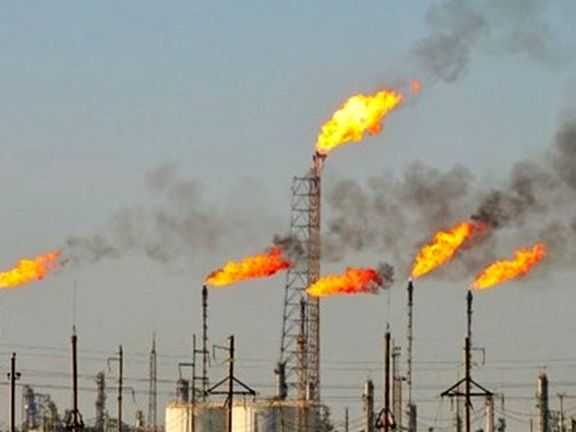
A high-ranking member of Iranian parliament says that currently almost one fourth of the energy produced in the country is being wasted.
Malek Shariati, the spokesman for the parliament energy committee said Sunday that 23% of the energy produced in Iran is lost due to technical gaps.
The latest report by the World Bank shows that the intensity of energy consumption in Iran in 2019 was four times more than the European Union.
Earlier, Mohsen Delaviz, a former CEO of Iran’s Fuel Consumption Optimization Organization had announced that 40% of the energy consumed in the country is wasted without reaching consumers.
A major part of Iran’s energy waste is in the production and transmission of natural gas, as well as the conversion of fossil energy into electricity.
Based on the World Bank figures, every year 18 billion cubic meters of gas is burned and wasted only in the production phase due to lack gas collection equipment. Almost nine billion cubic meters of gas is lost in the worn-out transmission and distribution network per year.
Iran's thermal power stations consume 70 billion cubic meters of gas and 20 billion liters of fuel oil and diesel annually while the average efficiency of thermal power plants in the country is about 37%.
On the other hand, official statistics released by the ministry of energy show that 13% of the electricity produced in the country is wasted in the transmission and distribution phases due to worn-out equipment.
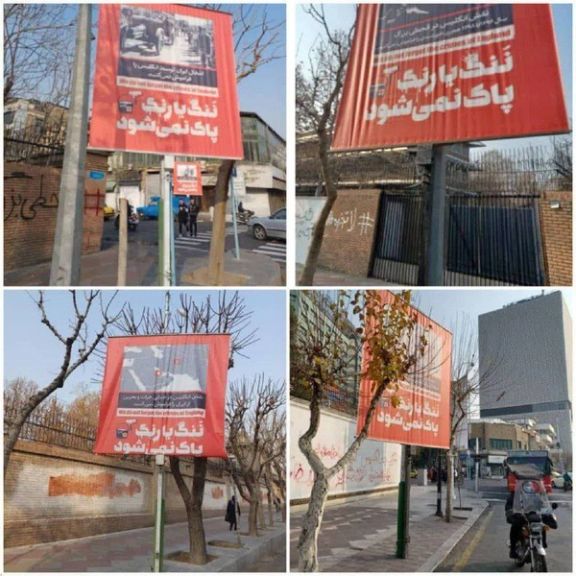
The municipality of the Iranian capital Tehran has in a move supported vandalizing the British embassy after anti-UK slogans were painted on its walls.
This comes a few days after a group of Iranian citizens voluntarily helped paint the walls of the British embassy vandalized with anti-UK slogans.
Tehran municipality, headed by a hardliner mayor, has installed banners near the embassy in the downtown bearing the sentence, “Shame cannot be erased with paint.”
The slogans had been apparently sprayed by some pro-regime elements to protest UK’s support for anti-government protesters in Iran.
Britain summoned Iran's most senior diplomat in London on December 9 to protest the hanging of Mohsen Shekari, the first protester to be executed.
British envoy to Tehran Simon Shercliff in a tweet on Thursday thanked Iranians and international friends from Germany, South Korea, France, Italy, Brazil and some other countries who sympathized with the UK.
Photos on social media show that Shercliff himself wass also helping people to paint the walls.
This was not the first time the UK embassy is vandalized by pro-regime hardliners. In 2011, the embassy was attacked by a mob of Basij militia and hardliner activists who ransacked offices and stole documents. One small building was also set on fire during the incident and several people were injured.
It came after the UK strongly supported punitive international sanctions over Iran's nuclear program and followed a vote in the Iranian parliament to downgrade ties with Britain and in effect expel the UK ambassador.
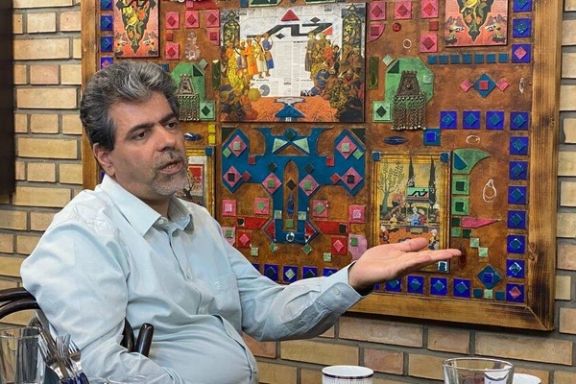
Iranian politician Hojjat Mirzaei, a former economic official, has characterized President Ebrahim Raisi's team as "the weakest of its kind in the past 80 years."
In an interview with moderate news website Khabar Online on Saturday, December 17, Mirzaei further said that the Raisi government’s plan to create "a paradise" with reliance on China and Russia has turned out to be an illusion. A very good paradise was how the president’s budget people earlier described the future of Khamenei's Looking East policy and Iran's cooperation with China and Russia.
Earlier, conservative commentator Mohammad Mohajeri had also called the Raisi administration "the weakest government in Iran's history." It appears that the view is shared by most of Islamic Republic political factions. Most recently, reformist cleric Mohammad Ashrafi Esfahani called the Raisi administration "the weakest government in Iran after the 1979 revolution."
Like Mirzaei, Ashrafi Esfahani further added that Iranians are in desperation as they have lost their hopes of a better future because of the poor performance of the Raisi administration. He said: "It is obvious that the people's financial situation will worsen, and their hopes will fade away when the government replaces experienced officials with those who have no outstanding background or experience.
He was clearly referring to the make-up of the government, which is stacked with less experienced hardliners loyal to the Revolutionary Guard and Iran’s ruler Ali Khamenei.
On Saturday, former Iranian Interior Minister Abdollah Nouri also said that "The Islamic Republic has reached a dead-end." He added that most independent observers in Iran are against the course the Islamic Republic pursues, but all the decisions in the country are being made by Supreme Leader Ali Khamenei and that is causing the impasse as no one listens to the majority of Iranians.
Khabar Online website in Tehran wrote that Raisi's slogans have not led to anything tangible. He promised to restore the battered currency rial, but in his 16 months in power the rial has fallen by nearly 50 percent, leading to fears to hyper-inflation.
Mirzaei argued that although the government is weak, but personnel changes will not help it much. "Iran's international relations and the structure of the government are the main problems," he said, adding that "the government should strive to revive the 2015 nuclear deal (JCPOA) and enact laws demanded by the international financial watchdog, the FATF, while also improving its ties with Iran's neighbors."
Mirzaei added that the most important jobs for the government is to introduce transparency, to control financial corruption and to pursue good governance. He maintained that "none of these have happened and it appears that there has been no will in Iran since 2017 to improve the situation. Hardliners have prevented the revival of the JCPOA before Raisi’s election and portrayed the former government as inefficient. These situation led to major protests in 2017 and 2019, and the latest presidential election in Iran in 2021 made the situation even worse."
The politician quipped that "While the situation is getting worse, Raisi is constantly talking about the train of progress."
However, it is not just Raisi who appears to be out of touch with the realities on the ground. Khamenei has also said on various occasions that foreigners have instigated the ongoing protests as they aim to stop Iran's progress.